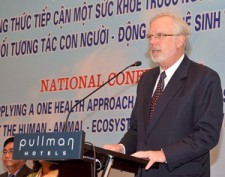
HANOI, April 3, 2013 -- It is my pleasure to join you in opening this important conference on One Health coordination. Vietnam is showing leadership in this area and the United States is very pleased to partner with Vietnam to effectively detect and control infectious diseases, before they damage the health and livelihoods of the people of Vietnam and the world.
Although the term "One Health" is new, the concept has been around for many years. We can see the "One Health" idea at work in Vietnam's effective coordination across sectors to address the problem of avian influenza. The United States has been pleased to work with the Government of Vietnam on this front and, through the United States Agency for International Development and the Centers for Disease Control and Prevention. We have provided over $70 million in assistance to date in support of a coordinated response regarding avian influenza. We look forward to continuing our partnership through One Health.
Nearly 75 percent of all new, emerging, or re-emerging diseases affecting humans in this century originated from animals. The speed with which these diseases can spread in our interconnected world presents serious public health, economic, and development challenges. Similarly, the impact of climate change on human health, whether through increases in malaria or greater exposure to animal diseases because of mankind's expanding habitat, is another example of why One Health matters. It also underscores the need for comprehensive disease detection and response, particularly in geographic areas where disease threats are likely to emerge such as Vietnam.
A sometime forgotten example of a zoonotic disease is HIV/AIDS. According to UNAIDS, an estimated 1.7 million people die annually from AIDS-related causes. The U.S. President's Emergency Plan for AIDS Relief -- PEPFAR -- was created in 2003 and is the largest commitment by any nation to combat a single disease internationally. To date, PEPFAR has invested over $40 billion globally and we are proud of the partnership we have here in Vietnam, where we are working hand-in-hand with the government of Vietnam to support a sustainable, high quality response to HIV/AIDS.
But One Health is more than simply responding to an outbreak of disease. It is recognizing the need to work together to prevent an outbreak from occurring in the first place.
Two key steps are required to accomplish this goal. The first is coordination: we must collectively recognize and leverage the linkages between multiple sectors to effectively address the threat of zoonotic disease. Creating synergies from our collective expertise will significantly improve our chances for success.
The second step is detection: We need to design a system that emphasizes prevention rather than response. Identifying emerging threats before they become the next outbreak will save time, it will save resources, and it will save lives.
Vietnam has experienced the costs of outbreaks firsthand through SARS (severe acute respiratory syndrome), avian influenza, rabies, and other diseases, some of which still remain threats today.
Creating an integrated One Health system is too big a task for any one sector. We must all share the load. Government, civil society, universities, mass organizations, the private sector, the media and others must be part of this effort. Only together can we ensure a safer future for the people of Vietnam and the world.







Comment
Make a general inquiry or suggest an improvement.